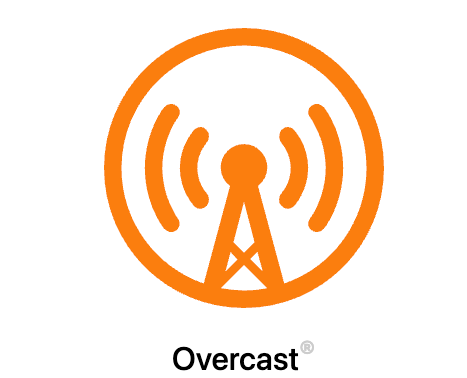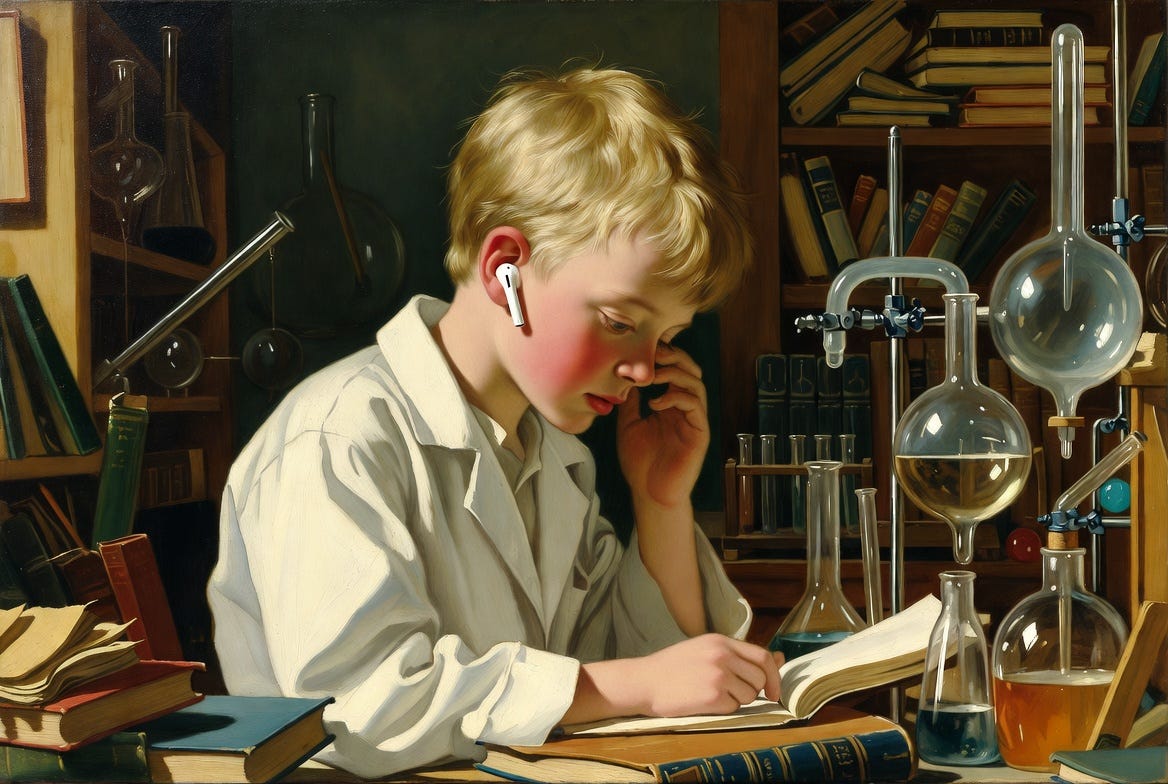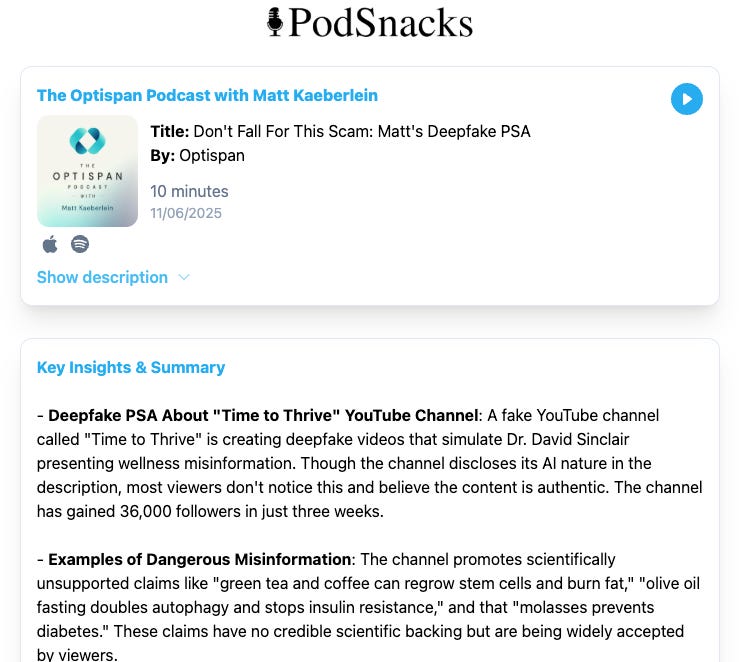Personal Science Week - 251120 Podcasts
Updated tips for better podcast listening
Podcasts are still a great, productive way to fill empty time while driving, exercising, or doing household chores—but the podcast landscape has changed since we last covered this topic in PSWeek240425.
This week we revisit podcasts for personal scientists with updates on AI-powered discovery tools and the shift to video-first content.
We last wrote about podcasts back in PSWeek240425, leaving more than a year of listening and learning to catch up on.
Listen to podcasts
Between commuting, exercising, doing household chores or other “empty” time, I listen to over 10 hours of podcasts per week, nearly always at 2x speed, which — give or take — is like getting an extra two days of education per week, all during time that would otherwise have been wasted.
I still mostly use the Overcast app on my iPhone, which when I started was the best app out there. I’ve dabbled with podcast players from Spotify, Amazon Music, and the YouTube app, but none of them quite caught on for me, and Overcast already has all my playlists organized so I haven’t bothered to switch. If you’re just beginning with podcast listening, the only features I consider mandatory are (1) ability to adjust playback speed, and (2) skip button. All of the free apps fit the bill, so my advice is to just pick one and start listening.
Somebody recently pointed me to PodNotes, an Obsidian plug-in that lets you listen to your favorite podcasts (at 2x if you like) and take notes or timestamps right within Obsidian. I haven’t had a chance to try it yet, but if it works as well as my friend claims it’ll be a game-changer.
Since around here our focus is personal science, we encourage you to develop your own personal feeds, but if you’re not a big podcast listener right now, my main suggestion is to treat podcasts differently than, for example, professionally-produced news shows or documentaries. The medium is best with long-form, unbounded interviews, especially with a good host, of which there are so many that it’s impossible to listen to more than a fraction.
In other words, you’re missing out if you stick to well-produced audio from mainstream publishers. Go into any podcast app and search, by name, for a person whose ideas interest you and start from there.
Podcast Summaries
Back in April 2024, we mentioned tools like Podwise for AI summarization. Today, my go-to is Podsnacks.org, which generates excellent AI summaries of popular podcasts. My free subscription emails me a daily concise, well-structured summaries of my favorite podcasts. It’ll save enormous amounts of time when deciding what’s worth your attention. The quality is good enough that now I now routinely scan AI summaries first before committing to a full listen.
Podwise is still nice when you’re searching for something in particular, but frankly there’s so much good stuff now that finding good listens is never the issue.
Academia.edu generates short (usually <5min) podcasts on thousands of science-related papers in their archives. For example, Top 10 Natural Language Processing Papers or Unlocking AI’s Potential: The Secret Behind DeepSeek’s Lightning-Fast Code Generation. These summaries are actually pretty good. My only issue is that there doesn’t (yet) appear to be a way to have them auto-downloaded to my podcast player.
Video Podcasts
Perhaps the biggest shift in the past year or two is that podcasts have become video-first. Nearly every major podcast now publishes full video versions on YouTube, and many are optimized for visual consumption from the start.
It’s unfortunate that YouTube is so dominant, because one nice thing about podcasts is that they are based on an open standard that let anyone publish a feed without risk of censorship or being locked into a particular provider. Much as I hate that lock-in, and as much as I hate the pileup of subscriptions, YouTube Premium is becoming mandatory if you’re serious about content. I pay $140/year and never listen to ads, and can download anything to listen/watch offline, and it comes with YouTube Music and its own podcast player.
So if you go to YouTube Premium, at least offset your dependence by giving up Google Search. I switched to the privacy-first Brave Browser a long time ago and literally have never missed Google once, ever.

Recommended Podcasts
Razib Khan’s Unsupervised Learning centers around Razib’s interest in genetics and historic DNA, but he often wanders into other sciencey topics like when he discussed “Bro Science” in a podcast with podcast with Alexander Cortez. Not sure why they use that term, because it sure sounds like personal science to me: an attitude toward better health and performance with a “stronger empirical basis and analytical orientation (and aversion to fads like “raw food”). Incidentally, if you’re interested in fertility, you’ll like that discussion and might want to check out Cortez company Ferta, which claims better metabolism can solve 90% of the cases.
You’ll lose your Personal Science membership card if you don’t listen to Tim Ferriss, at least occasionally. He’s the uber self-experimenter (and friend of the late Seth Roberts) who always has interesting discussions. One I liked recently was with Pablos Holman — One of the Scariest Hackers I’ve Ever Met (#827), or the one with Chris Hutchins whose podcast “All the Hacks” goes into practical details about “how to upgrade” your life with tricks like how to get health insurance outside an employer.
Curt Jaimungal and Theories of Everything is an incredibly deep look at everything related to advanced physics, math, the Universe, you name it. I especially liked an episode with Elan Barenholtz, cognitive scientist at Florida Atlantic University who says language is a self-contained, autoregressive system with no inherent connection to the external world. Always very provocative and mind-blowing. (Oh, and it’s the only place I know that has offered a super-deep discount on Claude Pro subscriptions)
Finally, you can watch me at The Science of You: Rewriting the Rules of Longevity , a fun 1 hr+ conversation on the Scales of Success Podcast with Marcus Arredondo. (transcript). I also was honored to appear on the Anti-Retirement Club with Curtis Estes where I showed plots and charts of my various experiments with microbiome, CGMs, and more.
Personal Science Weekly Readings
Literature-Based Discovery from the Elicit Blog seems like something where personal scientists can excel:
A field dedicated to finding “undiscovered public knowledge”—hidden connections in existing research. Don Swanson famously noticed that magnesium deprivation causes migraine-like symptoms, but papers on migraines and magnesium had never been linked. His hypothesis (dietary magnesium alleviates migraines) was later confirmed by clinical trials. Given the sheer volume of research, many such connections must exist but remain unknown.
Nocturia Deep Dive: The NIH’s detailed explanation of nocturia exemplifies high-quality human-curated medical resources—full of technical details and citations. These remain invaluable complements to LLM-based health research.
The $600 Toilet Camera: The bathroom plumbing company Kohler now sells the Dekota, a fixture that films your excrement with cameras and spectroscopy. A WSJ reporter’s verdict: interesting suggestions (”drink more on weekends”) but not worth the purchase.
Ideological Turing Test: Tom Stafford explores whether people can accurately simulate opposing viewpoints, with an interactive data explorer. Relevant for personal scientists navigating controversial health claims—can you steelman the opposite position?
About Personal Science
Personal Scientists use science for personal reasons, not as part of a job. We treat science as a verb—something you do—not as a noun, and certainly not as a synonym for “truth” or “cool facts about nature.” Personal scientists think for themselves rather than simply trust credentialed experts.
We publish this newsletter each Thursday, free to anyone who likes to use science in their daily lives. If you have topics you’d like us to cover, please let us know.





